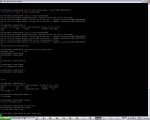Two questions as a newbie, please comment on both:
1.) I have no kwonledge on linux yet (Managing windows servers and linux based hardware-firewall), and I was going to choose centos, but my ISP recommended me Debian, so we installed debian. Do I have any incompatiblity, securtiy or stability issues with anything when using it with DA for a hosting company? Is it good choose to start from scrath or do I still consider choosing Centos? I googled around and everybody says something different. But generally speaking Debian seems to be a better choise from the results that I read. Because this is my first linux server, my other servers also will be linux so first choise is important to me.
2.) Centos life is till 2012 but what will happen then to all those users especially web host companies? Will they have to switch to an other OS that has a longer life?
Thanks for the comments.
CentOS 5 Full Updates run until: March 31st, 2011
CentOS 5 Maintanence Updates run until: March 31st, 2014
So you just earned two more years.
That's nearly 6 years from today.
While I'm sure there are folks who are running servers for 5-6 years on the same old systems with no problems, and even though hardware is now more stable and works longer than before, 5 years is a very long time.
There are always planned changes in architecture of OS or other softwares (PHP6 in the coming future) and every so often you will hear that "to maximize performance you should have...".
So 5 years from today, the available hardware will be dramatically different from what we have today.
So the timeline is really not the issue.
As for choosing Debian or a linux flavor, that is really a personal choice.
It is a matter of what you feel comfortable with.
I started out with Linux RH for my SSH access in 1997 and bought RH 6.0 book.
Ever since, I stuck with RH distro, then moved to WhiteBox and from there moved onto CentOS.
My WhiteBox 3.0 is running great since 2004, but the hardware is 'tired' so regardless of its operativity, I will have to retire the box soon.
Thats why I'm not really concerned with the Timeline of EOL.
My hardware will die first

)).
Just my $0.02.
-Alon.
 .
.